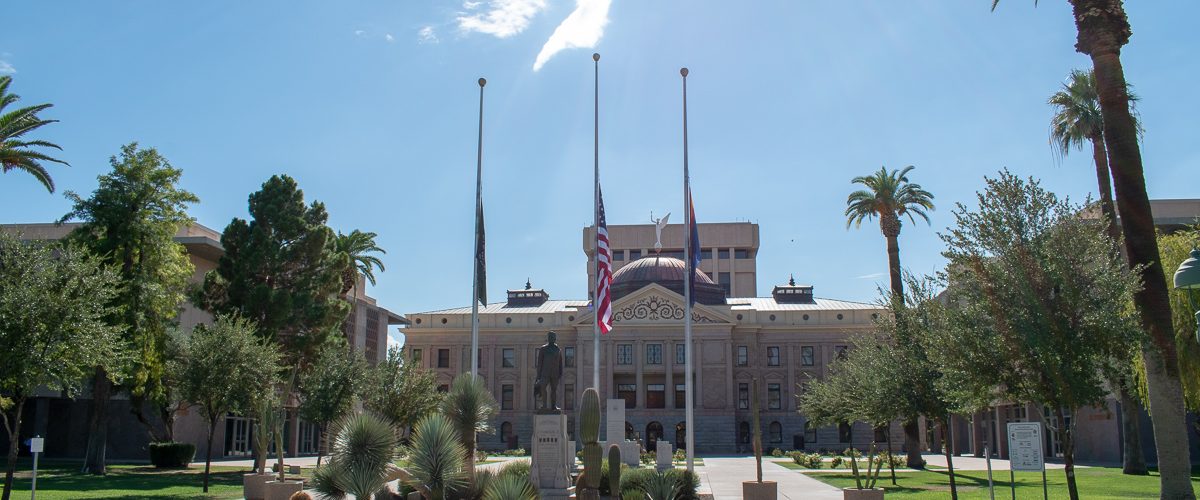In January, Governor Doug Ducey (R-AZ) released his proposed fiscal year (FY) 2020 budget. Now, the Arizona Legislature is taking steps to pass a final plan.
Over the past few months, state legislators have debated how the state government should allocate its money, including additional dollars for results-based funding and how to handle tax conformity.
Now, lawmakers are moving a budget package that reflects a compromise between the governor and Republican leaders. Both the Senate and the House of Representatives are slated to debate the package today. Here are the major highlights.
Tax Conformity, Rainy Day Fund and Debt
This tax season a debate broke out at the Capitol regarding the best way to conform to the new federal tax changes after the 2017 Tax Cuts and Jobs Act (TCJA).
If the state simply conformed to the new Internal Revenue Code (IRC), the Joint Legislative Budget Committee (JLBC) expected Arizona to receive $205.5 million in additional revenue resulting from Tax Year 2018.
Gov. Ducey wanted to save the additional revenue and put it towards Arizona’s rainy day fund, while others pushed legislation to reduce income tax rates.
The current budget proposal reduces the number of income tax brackets from five to four, lowers the state’s top tax rate to 4.5 percent, and conforms the state’s standard deduction with the federal standard deduction of $12,000 for single taxpayers and $24,000 for married couples.
According to the Governor’s Office, based on federal estimates, as many as 90% of taxpayers could be taking the standard deduction on both their state and federal forms.
The current proposal also includes a $542 million deposit into the Rainy Day Fund and reduces state debt by $220 million.
WayFair
In February, legislation was introduced to correct what proponents called a “fundamental unfairness” in Arizona tax law that provides an advantage to out-of-state sellers without a physical presence in the state by exempting them from state sales tax when selling to Arizona consumers.
A 2018 U.S. Supreme Court decision, South Dakota v. Wayfair, allows states to require remote (out-of-state) retailers and marketplace facilitators, such as eBay or Amazon, to apply local sales tax to purchases by in-state residents.
Local stakeholders have debated Wayfair implementation for months and have reached an agreement reflected in the current budget proposal.
The proposed law changes will require remote sellers of tangible retail goods to pay state and local sales tax. This requirement will also apply to third-party facilitators such as E-Bay. It also exempts micro businesses and hobbyists with less than $200,000 in gross annual sales, a threshold that steps down to $100,000 after three years; and also establishes a single tax retail base, in which definitions and treatment are uniform across the state.
“The introduced version of the Wayfair legislation raised concerns for NFIB members,” NFIB Arizona State Director Chad Heinrich said. “We are thankful for the opportunity to work with the sponsor and stakeholders in revising the legislation to remedy the issues that we identified. The revised version simplifies the Arizona retail tax base in a way that is fair to remote sellers—many of which are small businesses.”
Education
The K-12 and higher education budget proposals reflect a number of Governor Ducey’s original funding requests, including:
- The second installment of the 20 percent teacher pay raise for the upcoming school year.
- $136 million in restored “additional assistance” for schools.
- $68 million for Results-Based Funding, representing an additional $30 million over last year’s investment.
- $100 million, including a supplemental for this current year, for building renewal dollars and another $79 million to build new schools.
- Establishes a funding bonus for schools producing high-school graduates with industry certifications.
“The proposed expansion of Results-Based Funding to low-income schools on the cusp of excellence will be a game changer for students across Arizona, providing teachers and staff the resources necessary to continue to improve and expand,” A for Arizona Executive Director Emily Anne Gullickson said.
The proposal also includes new dollars for state universities, as well as for community colleges delivering educational programs in areas such as allied health professions and aerospace.
- $5.8 million to MCCCD nursing expansion
- $15 million to Pima Community College Aviation Program
- $15 million to AZ teacher Academy divided between University and post-baccalaureate community college programs
Transportation/ Infrastructure
The proposal includes grant funding for rural broadband upgrades, local infrastructure needs, and improvements to Interstate 17.
- $130 million is slated to expand the I-17 over the next three years between Anthem and Black Canyon City.
- $700,000 for the Mariposa Port of Entry Cold Inspection Facility.
- $3 million for broadband grants.
Another issue addressed in the budget proposal in the Highway Safety Fee. Last April, a $32 fee was added to Arizona vehicle registrations to fund the Arizona Department of Public Safety’s highway patrol operations. State legislation granted the Arizona Department of Transportation (ADOT) the authority to establish amount.
Since the registration fee passed last year, multiple state lawmakers have come out in opposition to it. The current proposal phases out the fee within five years but Senator Michelle Ugenti-Rita announced yesterday a deal to eliminate the fee in two years.
“AZ still has a HUGE transportation funding shortfall (about $62 billion) and we need to seriously address our funding needs if AZ is going to remain competitive in the marketplace, but it is good to see policymakers putting money into the infrastructure that drives our economy,” said the Arizona Trucking Association in a series of tweets. “Also of note, is the repeal of the Highway Safety Fee (HSF) over five years. While well intended, the HSF was bad public policy. There are better ways to fund public safety and our roads.”
















Add comment